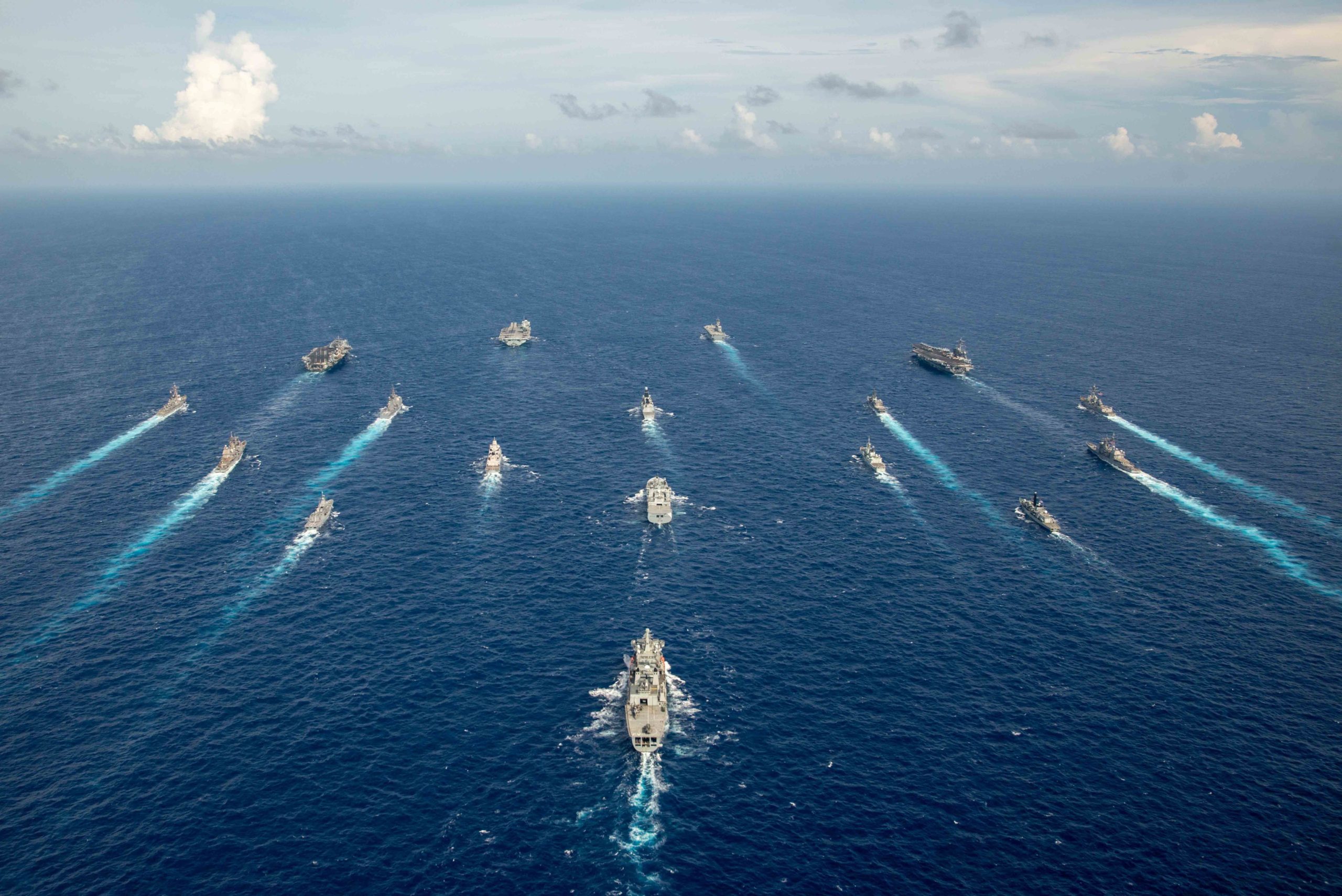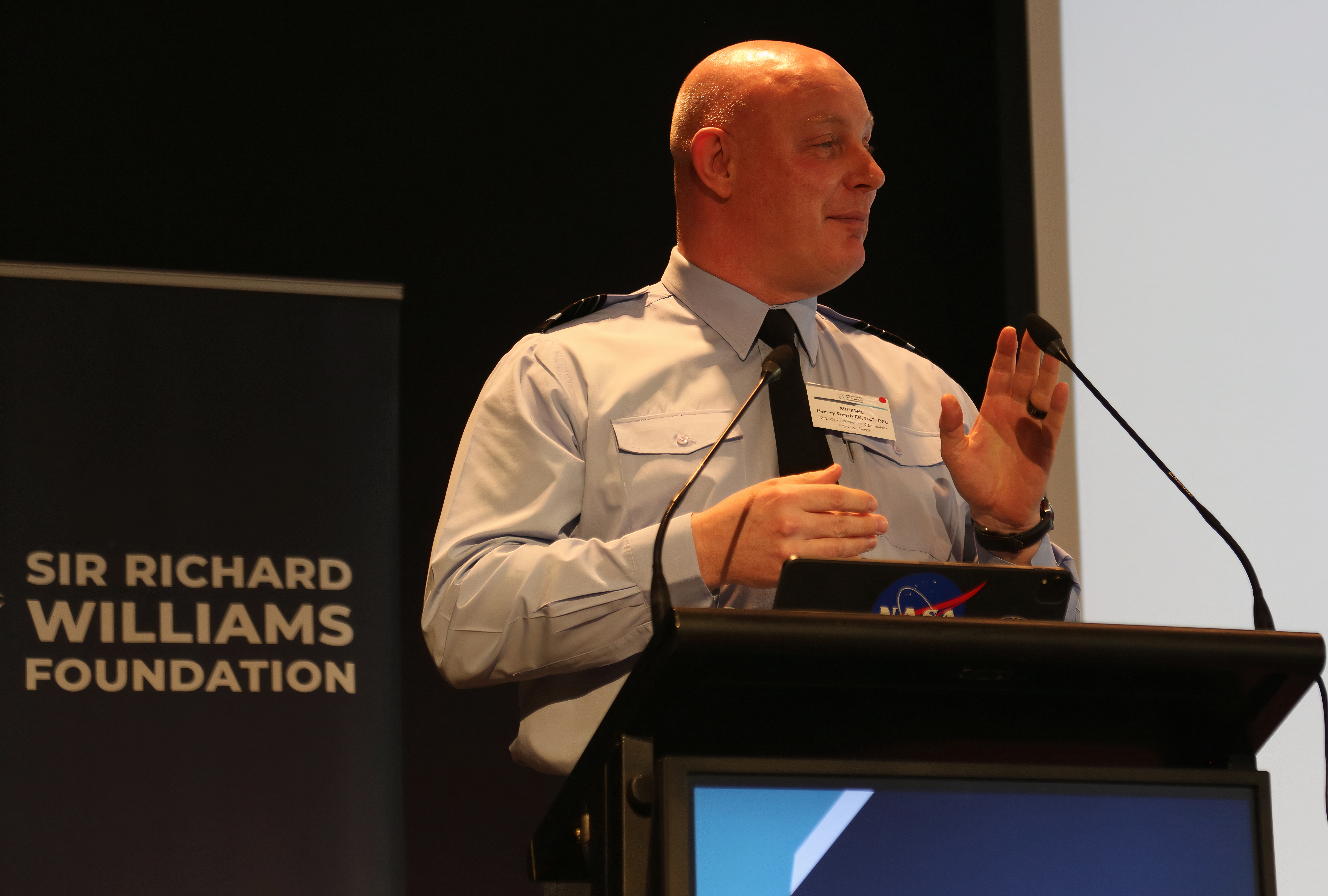By Robbin Laird
At the recent Sir Richard Williams Foundation Seminar held on 30 March 2023, Air Marshal Harvey Smyth, the Deputy Commander Operations, presented a UK perspective of the challenges facing the UK and her allies in the contentious 2020’s.
I first met Smyth when he was the head of the UK F-35 program. In an interview I did with him 2016, Air Commodore Smyth highlighted the coming of the F-35 the UK joint force. In that discussion, he highlighted the importance of the F-35 in enabling coalition operations, which is now considered a key element for integrated deterrence.
This what we emphasized in that interview: “It can be easily forgotten that the USAF and the RAF have not flown the same aircraft for a very long time indeed. The RAF and the Marines have flown Harriers and along with the Spanish and Italians formed a three-decade Harrier community. And Smyth as a Harrier pilot underscored the importance of this shared legacy moving forward.
“As an RAF pilot with significant maritime and carrier operational experience, we are shaping a collegiate and joint way ahead with the Royal Navy which brings the RAF domain knowledge of ways to operate in the extended battlespace with the coming of the F-35B to the new Queen Elizabeth class carrier.
“Being radical, I think it would make sense to put a picture of the Queen Elizabeth class carrier on our RAF recruiting poster: the RAF and the RN are jointly delivering the UK’s future Carrier Strike capability, and all RAF Lightning pilots will spend some of their time at sea, as I did throughout my 16-year career in Joint Force Harrier – we are forging an integrated approach together, which is incredibly exciting.”
The point simply put is that Smyth has been working integrated deterrence via the F-35 program for several years. But this was before Brexit, before several years of turbulence in UK and European politics and the return of war to the European context.

But it was also prior to the recognition of the broader challenges posed by the global reach of the 21st century authoritarian powers. When my co-author and I decided to write a book on the return of direct defense in Europe, which we started to write in 2014 and published in late 2020, our original publisher wanted this book to focus on Russia.
We significantly disagreed. We argued that the challenge for Europe’s direct defense was posed equally by China as a force within Europe and operating globally. Our view was an anomaly at the time, but it is no longer.
In fact, Air Marshal Smyth underscored that we now face a Euro-Atlantic-Pacific global threat envelope and that the UK is focused on shaping its contribution accordingly within the scope of its means. He argued that the UK recognized that global deterrence was the critical focus of their defense effort, but such a focus clearly needed to encompass close working relationships will allies going forward. He made the point that even for the United States it was beyond its capability to fight a two-front war.
This meant that shaping more effective allied cooperation through a process of integration was critical and that is what is meant by integrated deterrence. But such an aspiration cannot be realized within the legacy limits on information and technology sharing.
As he underscored: “The key to success will center on our ability to share more of our intelligence, share more of our information, sharing more data, and share more technology. We need to work together to identify the gaps and the vulnerabilities in our deterrence posture that an adversary might exploit. And we need to work out how best to work as a collective, rather than as individual nations. This is really, really hard to do.”
Air Marshal Smyth emphasized that in spite of its successes, NATO scoped to European defence was not enough for today’s UK deterrent structure. “It is clear that given the changing threat picture, effective defense deterrence will mean working through other groupings further beyond NATO, and beyond the Euro Atlantic theater, with a renewed emphasis on the concept of strategics, developing and establishing new frameworks, and building a new international security architecture to manage systemic competition and escalation.
“And in today’s multipolar environments, the UK will continue to develop a broader deterrence toolkit to include information operations and offensive cyber tools and make greater use of open source information alongside our historically more classified intelligence capabilities.”
“We will launch a new economic deterrence initiative to strengthen our diplomatic and economic tools to respond to and deter hostile acts by current and future aggressors. On nuclear, of course, the foundational component of UK is an integrated approach to deterrence with our minimal but credible, independent, UK nuclear deterrent. It is assigned to the defense of NATO to ensure that potential adversaries can never use their capabilities to threaten the UK, or indeed our NATO allies…
“We would consider using our nuclear weapons only in extreme circumstances of self-defense, including the defense of NATO allies, and of course, only the Prime Minister can authorize their use.
“But in addition to our nuclear deterrent, the UK’s conventional, cyber, and space forces are now becoming sufficiently capable, resilient, deployable and adaptive, to deter potential adversaries from engaging in conflict and to win if indeed, deterrence fails.
“Beyond these military instruments, we’ll also see UK working the much wider aspects of state power to increase the costs of aggression by hostile actors above and below the threshold of armed conflict. The UK will continue to develop such levers to adapt to the changing global threat environments. In particular, we will strengthen our economic capabilities and information statecraft…”
Air Marshal Smyth brought to the attention of the audience, the recent update of the 2021 UK Strategic Defence Review. The Integrated Review Refresh 2023 or the IRR was released last month. And in that review, deter and deterrence was frequently cited throughout and provides a good overview of the current UK government’s view of the deterrence challenge facing Britain and her allies.
Based on this document, Air Marshal Smyth discussed the UK current concept of deterrence.
As Air Marshal Smyth underscored: “We are all very familiar with the three C’s of traditional deterrence: capability, credibility, and communication. But in the UK, we’re now finding it helpful to consider integrated deterrence through the lens of an additional three C’s: comprehensive, coordinated, and coherence.
“First, deterrence must be comprehensive, as discussed in the IRR. This means taking into account all state levers of power and tailoring our approach to maximize use of those levers of power that are best suited to change the perceptions of a specific adversary. The integrated approach attempts to avoid the age-old temptation of over focusing on the military instruments of power… To be truly comprehensive, integrated deterrence must be both multi domain and multi-agency.
“Second, deterrence must be impeccably coordinated with allies and partners so that the impact of our actions are greater than the sum of the parts, from force posturing, all the way to the imposition of economic sanctions. None of us can do this alone.
“And whilst we have all worked hand in glove for many decades in terms of deterrence and defense, in today’s information driven, intimately connected, rapidly dynamic but ever shrinking world, there is always more effort required, especially if we are to truly deliver a coordinated, integrated, and determined effect.
“Lastly, we need to take a more coherent approach to developing our deterrence strategies, understanding the complex interplay across the spectrum of conflict and considering the temporal nature of crises to ensure that our activities remain aligned with the overall objectives and desired end states.
“It is fair to say that capabilities available to state and non-state actors in today’s complex world have blurred the traditional thresholds of conflict…And also understanding the role and the impact of strategic or nuclear messaging well below the nuclear threshold, as well as how to manage escalation over time. And this is definitely something Russia’s invasion of Ukraine has brought into sharp focus.
“Thus, alongside the long standing capability, credibility and communication aspects of deterrence, we add three more C’s of deterrence: comprehensive, coordinated and preparedness.
“And for me, there’s no question that the development of integrated deterrence remains incredibly complex both by necessity and by design across government, and working with allies is challenging enough in the best of times, but for sure, the juice is definitely worth the squeeze.”
The Deputy Commander Operations is the senior Royal Air Force war fighter responsible for the conduct of air operations at home and overseas. Working together with other Services and international operational commanders, he oversees the generation and employment of air power in all environments. This wide remit includes the Air Defence of the United Kingdom, the delivery of intervention operations abroad and the conduct of humanitarian and disaster relief operations.
Air Marshal Harvey Smyth was born and educated in Northern Ireland and joined the RAF in 1991 via the Sixth Form and Flying Scholarship Schemes. After qualifying as a fast-jet pilot, he spent 15 years as a frontline Harrier pilot and weapons instructor. He has extensive combat experience having flown hundreds of operational missions from both land bases and aircraft carriers over: Bosnia; Kosovo; Serbia; Iraq; and Afghanistan.
In staff roles, Smyth has worked in the UK Air & Space Warfare Centre and spent 2 tours in the F-35 Lightning programme: the first as the Requirements Manager in MOD’s Directorate of Equipment Capability, and the second based in Washington DC as the UK’s F-35 National Director, where he was at the forefront of bringing the first UK Lightnings into service.
In 2013 Smyth retrained as a Tornado pilot and became the Station Commander of RAF Marham, supporting concurrent operations in Afghanistan, West Africa, Iraq and Syria. On promotion to Air Commodore (1*) in 2015 he became the Tornado Force Commander, and shortly thereafter, the UK’s first Lightning F-35 Force Commander. He followed this with a short appointment as the Head of Carrier Enabled Power Projection (CEPP) within the MOD, before then conducting an operational tour as Director of the Combined Air Operations Centre in Qatar, responsible for planning and authorising ~1000 daily air & space missions at the height of the counter-ISIS campaign.
Promoted to Air Vice-Marshal (2*) in 2018, Smyth retrained as a Typhoon pilot and became Air Officer Commanding Number 1 Group (AOC 1Gp), where he was responsible for the Air Combat Group of the RAF. In early 2020, Smyth then became UK MOD’s inaugural Director Space, building the Space Directorate and setting the foundation for the stand-up of UK Space Command.
As a member of the PM-chaired National Space Council, and co-chair of the National Space Board, he was responsible for the production of UK’s first National and Defence Space Strategies, and establishment of a more ambitious Defence Space Programme. Smyth was promoted to Air Marshal (3*) in 2022 and appointed as the RAF’s Deputy Commander (Operations).


